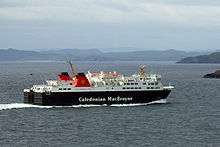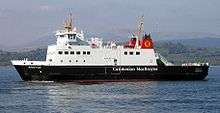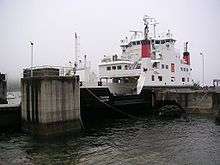Caledonian MacBrayne fleet

The Caledonian MacBrayne fleet is the largest fleet of car and passenger ferries in the United Kingdom. With 30 units in operation, the company provides lifeline services to 23 islands off the west coast of Scotland, as well as operating routes across the Firth of Clyde.
Caledonian MacBrayne (Calmac) vessels can be readily identified by their black hulls and white superstructures. They have red funnels with black caps that display the Lion Rampant badge with masts in buff. The fleet can be categorised into various groups. All vessels are owned by the asset holding company Caledonian Maritime Assets Limited, which is in turn wholly owned by the Scottish Government.
Groups of vessels

Major units
There are presently ten vessels over 80m length in the CalMac fleet: MV Isle of Arran, MV Hebridean Isles, MV Isle of Mull, MV Lord of the Isles, MV Caledonian Isles, MV Isle of Lewis, MV Clansman, MV Hebrides, MV Finlaggan, and MV Loch Seaforth. These vessels usually operate on the longer crossings, with high passenger numbers.
MV Loch Seaforth, at 116m in length the largest vessel in the fleet, operates on the Ullapool to Stornoway, Lewis crossing. MV Caledonian Isles has the highest passenger capacity and can carry 1000 people on the Ardrossan to Brodick, Arran crossing. MV Hebrides crosses The Minch from Uig, Skye, while MV Isle of Mull, MV Isle of Lewis and MV Clansman are based in Oban, serving Mull, Coll, Colonsay, Tiree and the Outer Hebrides. MV Lord of the Isles is based in Mallaig and serves Armadale and South Uist. MV Finlaggan and MV Hebridean Isles serve Islay from Kennacraig.[1] MV Isle of Arran, replaced at Islay in 2011,[2] links Ardrossan with Brodick and Campbeltown during the summer, and is a spare vessel during the winter months. Two new dual fuel ferries are being built by Ferguson Marine Engineering.[3] The first, to be named MV Glen Sannox is due to enter service at Ardrossan in 2018,[4] with a second vessel (Hull 802) following in 2019.[5]
Clyde services

The former Clyde ferries, MV Jupiter, MV Juno and MV Saturn provided the Dunoon and Rothesay services for the best part of 35 years. They were nicknamed the "streakers", because of their speed and ability to manoeuvre rapidly both at sea and in port. The Wemyss Bay to Rothesay route is now operated by two vessels, built in Poland, MV Bute (delivered in spring 2005) and MV Argyle, which entered service in 2007. There was much controversy following the decision to award the shipbuilding contracts to yards outside Scotland.[6] The streakers' removal from Rothesay was delayed by pier work to install an end-loading linkspan, allowing full ro-ro operation.[6]
From 2002, the service to Dunoon was supplemented by passenger catamaran MV Ali Cat, owned by Solent and Wightline Cruises and chartered by CalMac from Red Funnel Line.[7] MV Saturn last served Dunoon on 29 June 2011, and was then scheduled to operate the summer relief on the Arran crossing.[8] From 30 June 2011, the Gourock - Dunoon service was awarded on a passenger-only basis to the newly formed David MacBrayne Ltd subsidiary Argyll Ferries.[9] Argyll Ferries purchased MV Ali Cat and a former Irish boat renamed MV Argyll Flyer to serve the route. Argyll Flyer was not available for the start of the passenger-only service due to prop shaft problems. The company leased the cruise boat MV Clyde Clipper from Clyde Cruises to start the service, but she was out of service with engine problems for most of the first day.[10]
Juno and Jupiter were withdrawn from service in 2010, and by June 2011 Juno had been broken up at Rosneath,[11] while Jupiter was sold to breakers in Denmark for recycling in that month.[12]
Loch class

The Loch class are group of smaller vessels with a single car deck, running the length of the ship, with a ramp at each end. They vary in length from 54.27m down to 30.2m. Most are symmetrical when viewed from the side, with no operational bow or stern. Passenger accommodation is down one or both sides of the ship. MV Loch Portain, MV Loch Buie and MV Loch Shira also have a lounge above the car deck. They operate on shorter crossings, usually between 5 and 30 minutes, although MV Loch Portain takes 70 minutes to cross the Sound of Harris between Berneray and Leverburgh.
The original four Loch class vessels were based on MV Isle of Cumbrae. At 30.2m in length, they can carry 12 cars and 200 passengers.[1] The largest and newest, MV Loch Shira is 54.27m by 13.90m and can carry 32 cars and 250 passengers.[1] She was built for and is currently running on the Largs to Cumbrae route. The previous largest vessels in the class, MV Loch Fyne and MV Loch Dunvegan, a mere 7 centimetres shorter, were built for the Skye crossing. They were made redundant by the opening of the Skye Bridge and eventually found redeployment elsewhere.
Of similar design, but larger than the Loch class, MV Hallaig was launched in 2012 for the Raasay service. She is powered by a hybrid combination of batteries and a small diesel engine - a world first for a sea-going RO-RO vessel.[13] A second hybrid ferry, MV Lochinvar was launched in May 2013 for the Tarbert to Portavadie route.[14] The third hybrid ferry, MV Catriona, was launched on 11 December 2015 and entered service on the Claonaig to Lochranza route in September 2016.[15]
Island class

Eight Island class vessels were built by James Lamont & Co at Port Glasgow, between 1972 and 1976, as the predecessors to the Loch class. They were of a very simple design, based on World War II landing craft. They had a two-part folding bow ramp, leading to an open plan car deck incorporating a small turntable immediately aft and a sheltered area of passenger accommodation at the stern. The wheelhouse was above the passenger accommodation and the main mast above the ramp at the bow. A radar mast sat on top of the bridge, just forward of the small funnel and engine exhaust.[16]
Only two of the original eight remain in the fleet, MV Eigg and MV Raasay. They are the smallest vessels in Calmac's fleet and at 22.5m long can carry 164 passengers and 6 cars. MV Canna is now operated by Rathlin Island Ferry Ltd.[17]
Other vessels

There are two vessels in the fleet which cannot be listed in the above categories.
- MV Coruisk
MV Coruisk is a 65 m 'sheltered water vessel', operating on the Oban-Mull route in summer, and on the Clyde in winter. She appears rather tall for her length, and is very distinctive with her incredible jumble of passenger accommodation above the car deck - which is somewhat cramped with the exception of the forward table seating. She looks similar to the 'Loch Class' vessels, but has a recognisable bow and stern (this designation is only an operational one when sea conditions necessitate the use of the vessel's stabilising fins, otherwise adequate progress for crossings can be made in "reverse").
- MV Lochnevis
MV Lochnevis is a highly specialised ship serving the Small Isles of Eigg, Canna, Rùm and Muck from Mallaig. She is 49.2 m, and has capacity for 190 passengers. Her vehicle deck can accommodate up to 14 cars, but is empty on most sailings due to the lack of roads and vehicle restrictions on the Small Isles. It is instead used mostly for goods and vital equipment for the islands. Lochnevis has a surprisingly large vehicle ramp, which dominates her appearance.[18] This allows her to berth a considerable distance from slipways, protecting her exposed Azipod propulsion systems in shallow waters.
Fleet statistics
References
- 1 2 3 "On Board Your Ferry: The CalMac Fleet". Caledonian MacBrayne. Retrieved 1 July 2011.
- ↑ "Islay Ferry". Isle of Islay. Retrieved 7 December 2012.
- ↑ "Caledonian Maritime Assets Limited announces Scottish shipbuilder as preferred tenderer for two large ferries contract". CMAL. 31 August 2015. Retrieved 24 June 2017.
- ↑ "CMAL announces name of first LNG ferry". CMAL. 1 June 2017. Retrieved 24 June 2017.
- ↑ "Public invited to help name CMAL's first LNG ferry". CMAL. 2 May 2017. Retrieved 24 June 2017.
- 1 2 "History of MV Bute". Ships of Calmac. Retrieved 1 July 2011.
- ↑ "The Fleet - Ali Cat". Ships of Calmac. Retrieved 7 January 2012.
- ↑ "The Fleet - Saturn". Ships of Calmac. Retrieved 7 January 2012.
- ↑ "Gourock - Dunoon ferry". Transport Scotland. Retrieved 7 January 2012.
- ↑ Goodwin, David (2011-07-01). "Ferry Launch is hit by first-day breakdown". Greenock Telegraph. p. 2.
- ↑ "End of road for former Rothesay ferry". The Buteman. 20 May 2011. Retrieved 7 January 2012.
- ↑ "A tribute to MV Jupiter, 1973-2011" (video). National Steam Ship Preservation forum. Retrieved 7 January 2012.
- ↑ "History of Hallaig". Ships of Calmac. Retrieved 2 February 2013.
- ↑ "Hybrid Ferries Project". Caledonian Maritime Assets. Retrieved 24 August 2013.
- ↑ "New £12m CalMac hybrid ferry launched at Ferguson yard". BBC. Retrieved 11 December 2015.
- ↑ "Island Class Vessels". Ships of Calmac. Retrieved 2009-08-02.
- ↑ "Press Release: A Warm Welcome for New Rathlin Operator" (PDF). Rathlin Island Ferry Ltd. 28 April 2008. Retrieved 20 September 2009.
- ↑ "History - MV Lochnevis". Ships of Calmac. Retrieved 17 July 2010.
External links
| Wikimedia Commons has media related to Caledonian MacBrayne. |